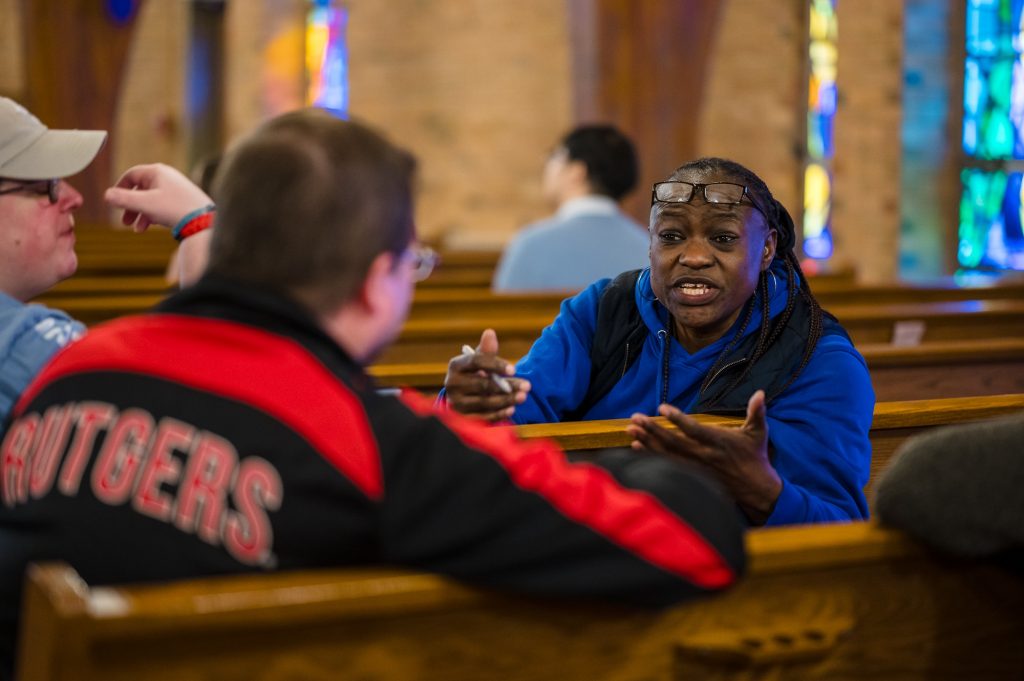The 2024 IGNITE Youth Conference will be held October 11-13, at the Wildwoods (NJ) Convention Center. Register now at www.ignitenj.org for the early bird fee. discount
By Krista B. Jefferies
 United Methodist youth ministry leaders, mostly from the New York and New Jersey annual conferences, attended a workshop February 24 at Aldersgate United Methodist Church in East Brunswick, NJ, to learn about caring for and igniting the hearts of youth of today but also about doing the same for themselves.
United Methodist youth ministry leaders, mostly from the New York and New Jersey annual conferences, attended a workshop February 24 at Aldersgate United Methodist Church in East Brunswick, NJ, to learn about caring for and igniting the hearts of youth of today but also about doing the same for themselves.
Their goal was to help youth leaders “fire up the youth in the community,” said host pastor the Rev. Sung Chun Ahn, lovingly known as Pastor Sunny. “Our hope is for youth leaders to leave today feeling supported to help them lead others.”
The full-day workshop began with worship, as everyone sang together to inspirational music, swaying with their hands and hearts lifted, before getting down to work.
Youth leaders of today face numerous obstacles, chief among them the post-pandemic decline in participation among our churches. One major goal is to draw young people back to the church and give them a place of peace, community and inspiration.
Aldersgate has been serving its community for over 60 years, and some former members of its youth group have become adult leaders of the group, hoping to inspire the younger generation. Ken Helsby was so impacted by the youth group when he was younger that he took on the role of Young Adult Ministries leader; and he is inspiring his current youth group members to follow the same path.
Helsby shared that youth ministry is all about having a passion to help kids develop their faith. “Students in middle and high school are worth our time,” he said, “and they’re worth our investment, not just physically but emotionally. If youth leaders are present and listen well and adapt to kids’ needs, they can be successful.”
His goal is to “give kids the tools they need to manage the noise in their lives and move forward. And they can always rely on the people they have connected with in the church.” He assures youth that his investment in them lasts forever. Even after they graduate, they can always come back to him for support.
Emily Rafano, a youth group member in 11th grade, attended the workshop and led the opening prayer. She is interested in possibly pursuing youth ministry in college. Whatever path of service she chooses, she plans to pass this torch on to the next generation.
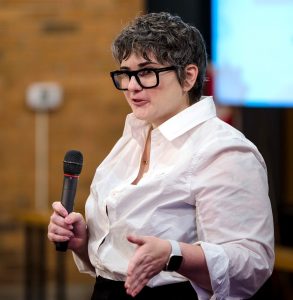
Liz Moore
Liz Moore from Princeton Theological Seminary’s Institute for Youth Ministry, keynoted the event, sharing that she became a Christian because of youth ministry. While struggling in her teenage years, she went with a friend to a youth group meeting and found there adults who cared about the things she was going through, who asked important questions, “who were invested in her because [she] was a child of God, and for no other reason.”
Igniting enthusiasm among the youth leaders, she expressed gratitude that they were there because they wanted to minister to youth just like her.
Moore engaged the group in various activities designed to help them reflect on what it means to be in youth ministry now. She cleverly had them consider what a resume for this position would look like if it were an actual job—the responsibilities and skills needed for the position, the expectations of parents and the needs of their youth. When they added in tight budgets, major health crises, church leadership changes and other challenges, they were overwhelmed by the multitude of things youth ministers are tasked with daily, weekly, quarterly and yearly.
“It’s exhausting,” admitted one participant, “and it impacts us and the work we do every day.”
Then Moore asked them to think about what first brought them to youth ministry. “If we look at this role as a job description,” she noted, “it can become crushing, and it becomes about successes and failures.”
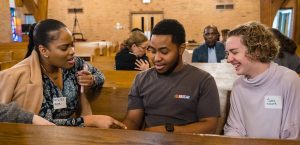 Many talked about this vocation as a calling, but also as so much more. “It’s a way of self-discovery, something you craft with God and with others, which makes it a creative enterprise.”
Many talked about this vocation as a calling, but also as so much more. “It’s a way of self-discovery, something you craft with God and with others, which makes it a creative enterprise.”
Moore encouraged participants to know their “why” and to consider that this is something God is asking them to do. She closed out the morning by noting that “the mindset of youth leaders trickles down to the people they are serving. Ultimately, we need to give them hope, joy, and love. They are the why.”
Then Moore opened the afternoon session by asking participants to write a mission statement about their “gospel gladness”—that is, the thing they could do for the rest of their lives—while recognizing the needs of the youth they serve.
Each answer was different because each person is different, and their relationship with God is unique. One youth leader said that kids “need to be motivated to come to church for themselves, not because they’re forced to by their parents.” Another said their goal was “to connect and protect and empower them to know who they are and how they fit into society.”
Another participant said, “Gospel gladness is providing a safe place for kids to be their weird selves and still be loved. Their need is to be able to express their emotions and be heard, to find their identity and vocation.”
Moore ended the activity by reminding everyone that “young people won’t just inherit the church; they are the church.” She noted that we all have to demonstrate being present with what God is up to in our own lives and have young people witness that. This is an opportunity for young people to see that there is something beneficial about having a relationship with God and the church.
“It empowers the spiritualization for teens,” she said. She also encouraged participants to consider what is working in their programs and what needs re-evaluating so they can help as many youth as possible in both big and small ways. “We get stuck in the programming we’ve inherited,” she asserted. “We don’t look up. We need to pause and be present.”
Youth leaders need to start with themselves and pass on the lessons they learn to the young people who are watching them. They make such an impact on the kids they serve, that even the smallest acts reverberate through their lives. But leaders cannot pour from an empty cup.
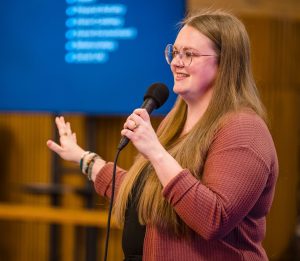
Mecan Payne
Mecan Payne, Next Generation Ministries program specialist, ended the day by focusing on a journey of wellness—physical, mental, and spiritual—for both youth and the youth ministers who lead them. “We talked about what teenagers need, but what about what ministers need?” she asked.
“Self-care” has become a buzz word today, but it is crucial that we take care of ourselves so that we may care for others, said Payne, sharing from the Bible Matthew 11:28-30: “Come to me, all you who are weary and burdened, and I will give you rest. Take my yoke upon you and learn from me, for I am gentle and humble in heart, and you will find rest for your souls. For my yoke is easy and my burden is light.”
She inspired all to find rest for their souls. “We so desperately want to see the youth grow and give them everything we have,” she said, “but we often don’t spend time on ourselves.”
Payne led an eye-opening “Circle of Life” activity for everyone in the room, using a color wheel to evaluate feelings about 12 areas of life listed on the wheel: joy, spirituality, creativity, finances, career, education, health, physical activity, cooking, home environment, relationships and social life. She reminded participants that they can become overly focused on one area and neglect others. “There are a lot of ebbs and flows,” she observed. “We have to consider that with our youth as well. They go through so much like we do.”
“Holistic health is continuing to check in with ourselves,” she said. “Where do I feel true joy? Where do I feel discontent? Where do I need to spend more energy? We must consider what and whom we want to pour our energy into. And we cannot forget to refill our own cups in the process.”
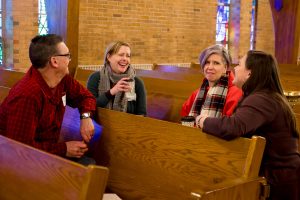 Payne noted that her goal for youth pastors is for them “to care for themselves where they need it, so they can care for others.” They should regularly check in with themselves, their team, and their youth to foster the personal wellness of themselves and everyone around them.
Payne noted that her goal for youth pastors is for them “to care for themselves where they need it, so they can care for others.” They should regularly check in with themselves, their team, and their youth to foster the personal wellness of themselves and everyone around them.
The entire workshop stressed the importance of nurturing, guiding and supporting the next generation of leaders, as well as the people who lead them. “If you’re a believer and you want your kids to be believers, the goal is to let them know they are loved—by God, by you, and by the church—unconditionally,” Ken Helsby said.
But we must also love ourselves unconditionally as God loves us, Payne added, “and then we will be able to continue to do His work in this life. In order to light a flame for someone else, we must ignite the leader within.”

